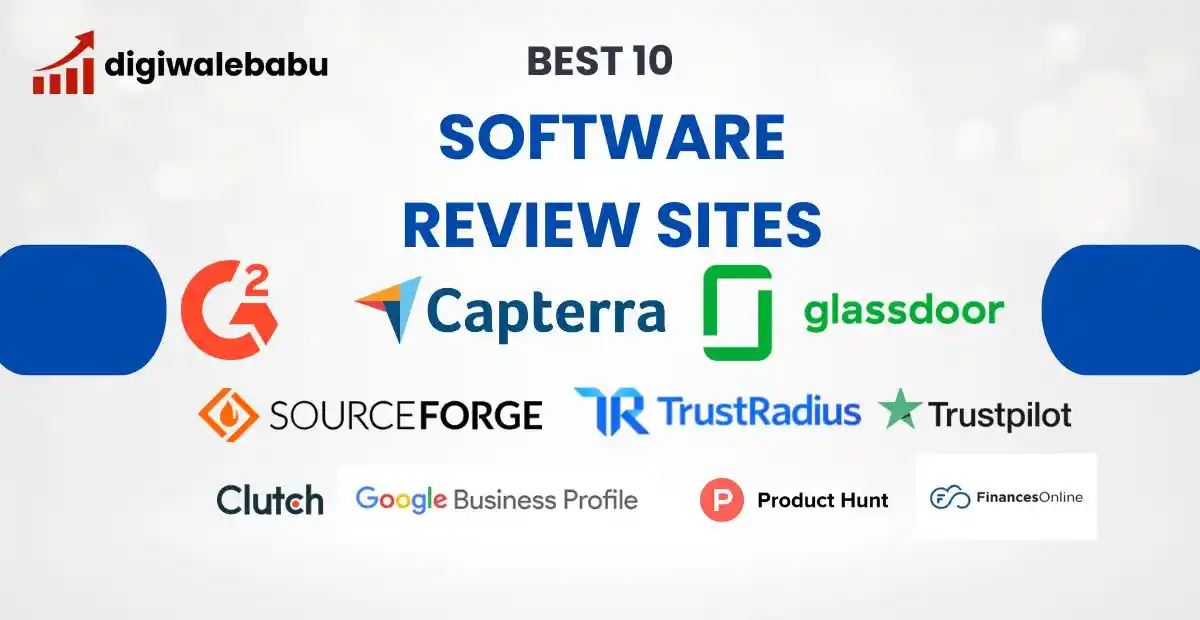
Find the 10 best software review sites
Top 10 Software Review Sites for 2025
If you are looking for software review sites, Top software review sites in 2025 include G2, Capterra, TrustRadius, and SourceForge, each offering extensive verified reviews across business and consumer applications. Other valuable platforms are FinancesOnline and Clutch, which provide detailed insights for enterprises and service providers. For startups, Product Hunt is a go-to hub, while Glassdoor and Google Business Profile help strengthen employer branding and customer trust. To build credibility with a global audience, Trustpilot remains a powerful resource.
Software buyers in 2025 face an overwhelming number of choices. Whether you’re a startup founder, an IT director at an enterprise, or a business consultant helping clients choose the right tools, you know that reviews carry significant weight. Honest feedback from real users reduces risk, clarifies expectations, and helps organizations make more confident investments.
For software vendors, review sites are equally powerful. They provide exposure, generate leads, influence purchase decisions, and build brand trust.
But not all review platforms are equal — each one attracts different audiences, serves different goals, and has its own strengths and limitations.
In this guide, we’ll break down the top 10 software review sites for 2025, explain what makes each one valuable, and highlight their pros and cons to help you decide where to focus your efforts.
Best 10 Software Review Sites For 2025

1. G2 — Best Software Review Platform in the US

G2 is widely regarded as the go-to destination for software buyers in the United States. With millions of verified reviews, the platform offers detailed product comparisons, feature breakdowns, and in-depth feedback that helps businesses evaluate tools at every stage of the buying journey.
G2 has established itself as one of the most trusted software review sites for businesses and individual users alike. Known for its massive user base and verified reviews, G2 helps buyers make confident software decisions.
The platform covers everything from small productivity tools to enterprise-level solutions, making it one of the most versatile software review platforms in the market.
One of G2’s biggest strengths is its credibility. Reviews are tied to LinkedIn accounts, which adds an extra layer of verification. This makes the feedback far more reliable than anonymous reviews.
For vendors, G2 is a powerhouse marketing tool. High rankings and positive reviews can translate into increased trust and inbound leads.
G2 also offers “Buyer Intent Data,” which shows which companies are actively researching your product or competitors. That insight can fuel sales strategies and outbound campaigns.
Pros and Cons of G2
| Pros | Cons |
| Massive U.S. user base and review volume | Paid features can be expensive |
| Strong verification system builds trust | Competitive categories are crowded |
| Detailed product comparisons | Smaller vendors may struggle to stand out |
| Useful buyer intent analytics | Requires ongoing review collection efforts |
2. Capterra — Best for B2B Software Companies Looking for Leads

Capterra is one of the most established software review sites, particularly effective for B2B companies aiming to generate high-quality leads. It is part of the Gartner Digital Markets network, which adds to its credibility and reach.
Capterra is part of the Gartner Digital Markets network and is designed to help buyers evaluate business software. Its directory-style format and intuitive filters make it easy for companies to compare solutions by category, industry, and feature set.
The biggest appeal of Capterra for vendors is its lead generation potential. Companies can run paid campaigns to appear higher in search results and capture buyer interest. This “pay-per-lead” model ensures that vendors only pay when a potential buyer engages with their listing, making it a highly performance-driven platform.
Capterra also awards “Top Performer” and “Best Ease of Use” badges that vendors can showcase on their websites, providing social proof to prospects. Buyers appreciate the ability to shortlist products and read quick comparisons without getting lost in long-form analysis.
Pros and Cons of Capterra
| Pros | Cons |
| Ideal for B2B software discovery | Paid leads can get costly in competitive niches |
| Simple and easy-to-use comparison tools | Reviews can be less detailed than G2 or TrustRadius |
| Strong SEO presence drives discovery | Limited depth for enterprise-level buyers |
| Offers badges and awards for marketing | Smaller vendors may get overshadowed by bigger brands |
3. SourceForge — Largest B2B Software Review Site by Traffic

SourceForge has long been recognized as one of the biggest software review sites in terms of traffic, especially for open-source software. It serves as both a repository for software downloads and a platform where users leave feedback.
SourceForge is best known as one of the oldest platforms for open-source projects, but today it doubles as one of the largest B2B software directories by traffic. Its strength lies in sheer visibility — many technical queries on search engines bring up SourceForge listings at the top, making it a valuable discovery tool.
Developers and IT teams frequently rely on SourceForge when searching for tools, particularly in technical or niche categories. Vendors benefit from the platform’s ability to generate long-tail organic traffic without heavy ad spend.
While it may not offer as many premium lead generation features as G2 or Capterra, SourceForge shines as an evergreen traffic driver. For businesses with developer-focused products or open-source components, it’s a must-have presence.
Pros and Cons of SourceForge
| Pros | Cons |
| Enormous traffic and SEO authority | Interface feels dated compared to newer platforms |
| Strong presence in developer and IT communities | Less focused on structured enterprise reviews |
| Great for open-source and niche tools | Fewer marketing features for vendors |
| Listings rank high in Google search results | Review quality can vary in depth |
4. Glassdoor — Best Review Site for Employer Branding

While Glassdoor is often associated with job seekers, it also plays a major role in the world of software review sites by influencing employer branding.
Employees and former staff leave detailed reviews about company culture, salaries, and management practices, which indirectly impact how software vendors are perceived.
Glassdoor isn’t about reviewing software — it’s about reviewing employers. But for software companies, this matters more than ever. In 2025, job seekers, partners, and even customers check Glassdoor ratings before engaging with a brand.
Glassdoor gives potential employees insight into company culture, leadership, salaries, and benefits. A strong Glassdoor presence signals that your company values transparency and treats employees well. This directly impacts hiring, employee retention, and even customer trust.
Vendors can claim employer profiles, respond to reviews, and showcase company awards. Companies with poor Glassdoor reputations may face challenges attracting top talent, which in turn affects innovation and customer satisfaction.
Pros and Cons of Glassdoor
| Pros | Cons |
| Crucial for attracting and retaining talent | Negative reviews are very visible |
| Offers detailed employer insights | Difficult to control anonymous feedback |
| Public responses improve brand perception | Not designed for product comparisons |
| Awards (e.g., “Best Places to Work”) boost employer branding | Requires ongoing HR/PR management |
5. Google Business Profile (formerly Google My Business) — Best for Visibility

Google Business Profile (formerly Google My Business) is one of the most powerful software review sites for local visibility. While it’s primarily used for local businesses, software companies — especially SaaS providers — can leverage it to build trust with customers.
Google Business Profile is more than a review site — it’s a trust signal embedded directly into search results. When prospects Google your company, your profile, ratings, and reviews often appear first.
For software vendors, especially those with local offices or service-based offerings, Google reviews carry enormous weight. They influence SEO rankings, buyer trust, and even partnerships. A business with poor or missing Google reviews risks losing credibility before a buyer ever reaches the website.
The platform also supports photos, Q&A, and updates, allowing businesses to share content directly within search results. It’s a free but powerful tool to manage reputation and increase discoverability.
Pros and Cons of Google Business Profile
| Pros | Cons |
| Appears directly in Google Search and Maps | Reviews can be difficult to manage if negative |
| Strong influence on local SEO | Review removal policies are strict |
| Free to claim and optimize | Not detailed enough for in-depth product reviews |
| Supports updates, photos, and events | Must be actively monitored for customer questions |
6. TrustRadius — Best for Enterprise-Grade Software

TrustRadius stands out as one of the most credible software review sites for enterprise-grade solutions. Unlike platforms that focus on smaller tools, TrustRadius specializes in detailed reviews for complex and large-scale business software.
TrustRadius has built its reputation on depth over volume. Unlike platforms that emphasize quick star ratings, TrustRadius requires reviewers to provide detailed feedback, including business context, ROI analysis, and use cases. This makes it especially valuable for enterprise buyers who need serious insights before committing to high-cost software.
For vendors, TrustRadius offers credibility. A strong presence here can make the difference in an enterprise RFP process. Buyers know that reviews are vetted, long-form, and tied to professional roles.
Because reviews are lengthy and structured, TrustRadius reviews often carry more weight in decision-making than shorter testimonials elsewhere. While it’s not as big on lead-gen volume as G2 or Capterra, its influence in enterprise deals is significant.
Pros and Cons of TrustRadius
| Pros | Cons |
| In-depth reviews provide real buyer context | Fewer reviews than mass-market platforms |
| High credibility among enterprise buyers | Slower review collection process |
| Strong reputation in IT procurement teams | Less useful for small or consumer products |
| Vendor insights and analytics available | Limited free features for vendors |
7. Trustpilot — Best for B2B and B2C Companies

Trustpilot has established itself as one of the most recognizable software review sites, with a strong presence in both B2B and B2C markets. It allows businesses to collect customer reviews that appear on Google search results, boosting credibility.
Trustpilot allows companies to request reviews from customers after transactions, which helps generate a steady flow of fresh feedback. Its trust badges are widely recognized and can boost conversion rates when displayed on websites and checkout pages.
However, Trustpilot has faced scrutiny over fake or manipulated reviews in the past. That said, it continues to improve transparency and remains a major trust signal for online buyers.
Pros and Cons of Trustpilot
| Pros | Cons |
| Large, global consumer reach | Historical issues with review manipulation |
| Excellent for B2C and SaaS products | Premium features are behind paywalls |
| Recognized trust badges improve conversions | Less focus on deep enterprise reviews |
| Easy integration with websites and emails | Requires consistent monitoring |
8. Product Hunt — Best for Indian Products and Global Startups

Product Hunt is a unique player among software review sites, focusing primarily on new, indie, and innovative products. It has become a launchpad for startups, developers, and SaaS founders who want to gain visibility in competitive markets.
Product Hunt is where new products launch, gain early adopters, and attract media attention. For startups, indie makers, and especially Indian companies entering global markets, Product Hunt is a launchpad.
A successful Product Hunt debut can drive thousands of visitors, signups, and investor interest. The community values creativity, innovation, and transparency. Buyers use Product Hunt to discover unique tools before they go mainstream.
While the platform isn’t built for long-term review collection, it excels at generating buzz and providing immediate feedback from early adopters. It’s particularly strong for B2C apps, developer tools, and creative platforms.
Pros and Cons of Product Hunt
| Pros | Cons |
| Excellent for product launches and visibility | Traffic spike is usually short-lived |
| Strong community feedback culture | Not ideal for enterprise sales |
| Great exposure for Indian startups | Competitive launches require preparation |
| Can attract press and investor attention | Reviews are more like comments than structured insights |
9. FinancesOnline — Best for Expert Reviews and Comparisons

FinancesOnline is another respected name among software review sites, known for its professional reviews and comparisons. The platform combines expert opinions with user feedback, giving buyers a balanced perspective.
FinancesOnline combines editorial reviews with user testimonials, giving buyers a balanced view of products. Its in-house team produces detailed reviews, feature comparisons, and rankings, which adds authority beyond just user feedback.
For vendors, a listing on FinancesOnline provides SEO value and credibility. The platform also offers awards such as “Great User Experience” and “Rising Star,” which can be repurposed in marketing campaigns.
While it doesn’t have the same review volume as G2 or Trustpilot, its curated content makes it a valuable complementary platform, particularly for mid-market vendors.
Pros and Cons of FinancesOnline
| Pros | Cons |
| Expert editorial reviews add authority | Smaller audience compared to bigger players |
| Awards and badges enhance brand credibility | Editorial process can feel selective |
| Good for SEO and third-party validation | Less user-generated content |
| Balanced mix of expert and customer input | Limited lead generation features |
10. Clutch — Best for B2B Services and Agencies

Clutch is one of the top software review sites for service providers, agencies, and IT consultancies. While many platforms focus solely on SaaS tools, Clutch specializes in vendor-client relationships for services such as app development, web design, and consulting.
Clutch specializes in services and agencies rather than software alone. If you’re looking for a software development firm, marketing agency, or consulting partner, Clutch is the first place to check.
Clutch reviews focus on project outcomes, budgets, and client relationships. This makes them highly valuable for businesses evaluating service providers. For software vendors, Clutch is particularly relevant if your product requires third-party implementation or consulting.
Vendors and agencies benefit from detailed case studies, verified client reviews, and category rankings. Buyers get confidence that they’re choosing partners who can deliver results.
Pros and Cons of Clutch
| Pros | Cons |
| Best platform for agencies and service providers | Less relevant for pure software evaluation |
| Reviews focus on project outcomes | Review process can be lengthy |
| Strong credibility with B2B buyers | Paid listings can be expensive |
| Great for implementation partners | Requires active review solicitation |
Best 10 Software Review Sites for 2025, Quick View
| Software Review Site | Software Gist | Pros | Cons |
|---|---|---|---|
| G2 – Best Software Review Site in the US | Leading U.S. software review site with millions of verified reviews and comparison grids for SMBs and enterprises. | • Millions of verified reviews • Easy comparisons •Strong U.S. trust | • Overwhelming data • Paid placements favor big brands |
| Capterra – Best for B2B Leads | A Gartner-owned software review site known for B2B lead generation, detailed categories, and advanced filters. | • Strong B2B lead gen • Trusted authority • Useful filters | • Crowded categories • Paid ads dominate |
| SourceForge – Largest by Traffic | High-traffic software review site popular for open-source downloads and user reviews. | • Huge visibility • Strong open-source community •Free distribution | • Outdated UI • Reviews lack depth |
| Glassdoor – Best for Employer Branding | Employee-driven review site shaping employer branding, culture, and trust for tech vendors. | • Boosts employer brand • Shows culture • Attracts talent | • Negative reviews hurt • Not product-focused |
| Google Business Profile – Best Local Platform | Google’s local review site helping SaaS vendors rank in search with strong SEO influence. | • SEO boost • High visibility • Easy to use | • Fake reviews risk • Limited B2B detail |
| TrustRadius – Best for Enterprise Software | Enterprise-focused software review site with transparent, in-depth feedback on complex tools. | • Detailed reviews • Verified feedback • Ideal for enterprise | • Costly listings • Less SMB-focused |
| Trustpilot – Best for B2B & B2C | Global software review site for both B2B and B2C, enhancing trust with badges and Google snippets. | • Global trust • Boosts conversions • SEO benefits | • Fake review risk • Expensive tiers |
| Product Hunt – Best for Startups | Community-driven review site for startups and indie products, with daily launches and voting. | • Great launch platform • Engaged community • Viral potential | • Short visibility window • Community-driven success |
| FinancesOnline – Trusted Balanced Platform | Expert + user software review site with awards, scoring, and credibility badges. | • Expert + user mix • Award credibility • Scoring system | • Smaller audience • Paid promos dominate |
| Clutch – Best for Service Providers | Service-focused review site with verified client interviews for IT, consulting, and agencies. | • Verified reviews • Trusted for services • Strong IT focus | • Not SaaS-focused • Competitive market |
Software Gist: Top 10 Software Review Sites for 2025
- G2 → Best U.S. software review site with millions of verified reviews.
- Capterra → Great for B2B companies seeking high-quality leads.
- SourceForge → Largest by traffic, popular for open-source software.
- Glassdoor → Shapes employer branding through employee reviews.
- Google Business Profile → Boosts local SEO with customer reviews.
- TrustRadius → Best for enterprise-level, in-depth reviews.
- Trustpilot → Works for both B2B and B2C trust-building.
- Product Hunt → Launchpad for startups and indie tools.
- FinancesOnline → Balanced reviews with expert + user scoring.
- Clutch → Best for service providers, IT, and consultancies.
Quick Gist:
- For broad reach → G2, Capterra, SourceForge
- For enterprise detail → TrustRadius, FinancesOnline
- For trust building → Trustpilot, Google Business Profile
- For startups/services → Product Hunt, Clutch
- For brand perception → Glassdoor
People also ask on software review sites
Which site is best for reviews?
The best site for reviews depends on your needs. G2 is the most trusted for overall software insights, while Capterra is ideal for B2B lead generation and Trustpilot is best for building global brand trust.
What are software reviews?
Software reviews are user or expert evaluations that share real experiences, pros, cons, and ratings of a software product. They help buyers compare options and make informed decisions before purchasing.
What is the G2 review site?
G2 is a leading software review site where users share verified feedback on business tools and applications. It helps companies compare products, check ratings, and choose the best software based on real user experiences.
What site has the best reviews?
The site with the best reviews depends on context. G2 offers the most comprehensive software reviews, Trustpilot excels in global consumer trust, and Capterra is strong for B2B software comparisons.
What is the biggest review app?
The site with the best reviews depends on context. G2 offers the most comprehensive software reviews, Trustpilot excels in global consumer trust, and Capterra is strong for B2B software comparisons.
What is a trustworthy review site?
A trustworthy review site is one that verifies user feedback, filters out fake reviews, and provides balanced insights. Examples include G2, TrustRadius, and Trustpilot, which ensure authenticity and transparency in their review processes.
What is Trustpilot used for?
Trustpilot is used for collecting and displaying customer reviews for both B2B and B2C companies. Businesses use it to build trust, improve credibility, and showcase customer satisfaction, while buyers rely on it to make confident purchasing decisions.
Can I trust Trustpilot reviews?
Yes, you can generally trust Trustpilot reviews because the platform verifies users and monitors for fake feedback. However, like any review site, it’s best to read multiple reviews and look for patterns rather than relying on a single opinion.
Final Thoughts
Choosing the right software review site depends on your goals, audience, and business stage.
- For broad visibility and trust, platforms like G2, Capterra, and SourceForge stand out with massive reach and verified user insights.
- For enterprise-level detail, TrustRadius and FinancesOnline deliver in-depth reviews tailored to complex solutions.
- If your focus is on brand trust and reputation, Trustpilot, Google Business Profile, and Glassdoor help strengthen credibility among customers and employees.
- For emerging startups or niche products, Product Hunt provides a launchpad, while Clutch is the go-to for service-based companies and IT providers.
In 2025, no single review platform fits every need. A smart strategy is to combine multiple software review sites—balancing reach, trust, and lead generation—so your brand connects with the right audience at the right stage of their journey.
